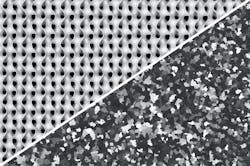Alloyed (Yarnton, England), a part of the Casting-Hybrid-Additive-Manufacturing-Parts-Production (CHAMPP) consortium, has been awarded a significant grant to research, develop, and test an innovative new hybrid production process that will address a number of the key limitations of additive manufacturing for the automotive sector, specifically electric vehicles (EVs). The CHAMPP program brings together three key partners: Alloyed, Brunel University London’s BCAST, Gestamp, and its affiliate Autotech.
With the EV market projected to reach multi-million units by 2030, the automotive industry is constantly working on solutions to meet the challenges associated with heavy batteries and developing lighter-weight components to achieve efficiency targets. Additive manufacturing has long offered automotive designers and manufacturers the potential to overcome these challenges, but is currently still limited by the speed of the processes, maximum part size, and a relatively high cost-per-part, which is generally twice the cost of casting production methods.
The CHAMPP program will investigate a hybrid approach to the production of parts by considering the benefits of both casting and additive manufacturing. The expertise of Alloyed in developing novel and innovative new alloys using its Alloy by Design (ABD) platform for both casting and additive manufacturing, as well as the capabilities of its Engine platform for increasing additive manufacturing performance, goes together with the expertise of BCAST and Gestamp in their respective fields of casting research and world-class global manufacturing of automotive parts.
The vision is to combine the low cost-per-part capabilities of casting with the design and production flexibility of additive manufacturing, such that automotive manufacturers will be able to cast their standard components across multiple models, and subsequently use metal additive manufacturing to customize those standard parts for specific variants at the volumes required.
To date, research has mostly focused on steel materials. However, complex supply chains and/or expensive new machines have been a barrier to large-scale hybridization reaching the mainstream. Research on hybridization using aluminum (or alloys) has been limited by traditional cast/wrought alloys, which when used with additive manufacturing processes result in poor mechanical performance. Similarly, current aluminum-alloy powders for additive manufacturing are generally not suited for automotive production applications, as they are expensive and result in poorer mechanical properties with many defects.
The CHAMPP project aims to build on the consortium's prior alloy and hybridization research to develop and test new aluminum alloy(s) better suited to future automotive needs. The focus will be on developing alloys that can first be cast and then subsequently built on to produce custom/complex features using additive manufacturing techniques with a compatible alloy that maintains mechanical properties and performance.
